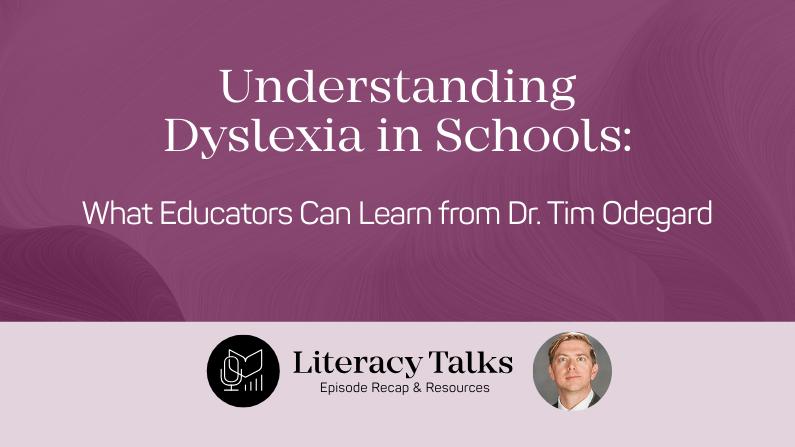In this episode of Literacy Talks, we’re joined by Dr. Tim Odegard—renowned dyslexia researcher, advocate, and professor at Middle Tennessee State University. Alongside hosts Stacy Hurst and Donell Pons, and later joined by Lindsay Kemeny, this conversation explores what it truly means to support students with dyslexia—emotionally, academically, and systemically.
This blog post recaps the key takeaways and provides helpful links and resources for educators, administrators, and families who are focused on understanding dyslexia in schools.
Dr. Tim Odegard’s Lived Experience and Expertise
Dr. Odegard shares his powerful personal story of growing up with undiagnosed dyslexia—and the long-term emotional and physical costs of being unsupported by the educational system. This lived experience, paired with decades of research, gives him a unique voice in the conversation about dyslexia and school practices.
🎧 Listen to Tim describe how early academic struggle without support led to overcompensation, chronic stress, and health consequences—and why he’s committed to changing outcomes for today’s students.
Dyslexia and Mental Health: A Critical Connection
One of the most important insights in the episode is the strong correlation between reading struggles and mental health issues like anxiety and depression. Dr. Odegard explains that chronic academic stress, particularly when schools fail to intervene early, can have life-long emotional impacts.
📚 Resource: Classroom Strategies to Address Anxiety in Children who Struggle with Reading by Sharon Vaughn, Ph.D. and Amie Grills, Ph.D.
Redefining Dyslexia: Why the Current Definition Falls Short
Dr. Odegard argues that it’s time to revisit how we define dyslexia. Today, we understand dyslexia not as a static diagnosis but as a continuum of risk and resilience, shaped by genetics, environment, and early experiences. Schools that treat it as a fixed condition may overlook opportunities to intervene and support students before the emotional toll deepens.
📄 Dr. Odegard’s article in the 75th Anniversary Edition of IDA’s Perspectives Magazine, Structured Literacy: The Backbone of a Robust Literacy Ecosystem.
What Educators and Schools Can Do Differently
The episode outlines clear, research-based recommendations for how schools can better support students with dyslexia:
- Early Screening and Intervention: Waiting until third or fourth grade is too late. Intervening in K–2 can dramatically reduce the long-term academic and emotional impact.
- Integrated MTSS: Schools should integrate academic and behavioral supports—not treat them as separate systems.
- Build Trust: Dr. Odegard emphasizes that much of the legislation we see today stems from a lack of trust between families and schools. Schools must do the hard work of listening, acknowledging, and showing they care.
🛠️ Download A Simple Guide to MTSS, Six Steps to Build an Effective Tiered Support System
A Parent’s Perspective: Lindsay’s Story
Midway through the episode, Lindsay joins the conversation and shares her son’s experience with dyslexia. From early signs in kindergarten to a diagnosis in second grade and ongoing depression, she reinforces the truth: reading ability and self-esteem are deeply connected.
💡 As his reading improved, so did his confidence—a powerful reminder of why early, effective support matters.
Resources for Further Learning
Here are some of the most impactful tools and readings mentioned or inspired by the episode:
- Reading Horizons Science of Reading Collective — Free community for literacy educators with access to decodable texts, sound wall tools, and more.
- The Myth of Normal by Gabor Maté — Discussed by Dr. Odegard as influential in understanding the intersection of trauma, stress, and learning.
- Jon Kabat-Zinn’s Full Catastrophe Living — A foundational book on mindfulness and the mind-body connection, referenced by Dr. Odegard.
Final Thoughts: Why Understanding Dyslexia in Schools Matters
Dr. Odegard leaves us with a sobering reminder: students with untreated dyslexia can suffer deeply and silently. Schools must stop seeing dyslexia as an unchangeable diagnosis and start seeing their role as either a risk factor or a protective factor in a student’s life.
The stakes are higher than we think—but so is the potential for change.
Subscribe to Literacy Talks and never miss an episode that helps you grow as a literacy leader. Got questions or insights? Join the conversation in the Science of Reading Collective.

